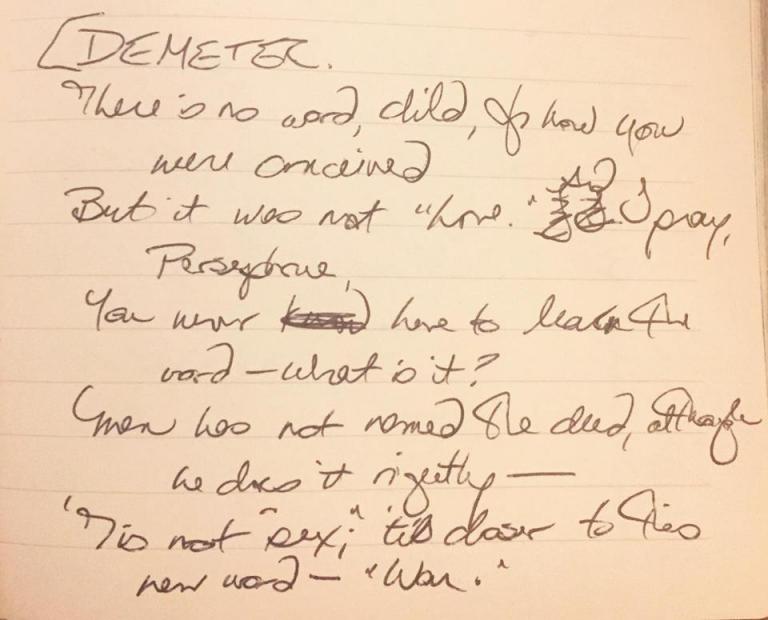
As some of you may know, I’m currently – of my own free will – in a ridiculous, exciting, absurd, and impossible endeavor of putting up four of my verse plays (two and a half of which are still in development) this October.
“Emily!” You may say, along with my mother who is doubtless shaking her head. “Why?”
“Why not just do one play? The one that’s done and polished?”
“Preferably written by someone else?”
“Why put yourself under so much pressure??!?!?”
Trust me, I’ve been asking myself the same question. And yet, we have a brilliant cast who seems happy to join me on this quest. As have multiple actors before them. When I call them up and say: “Hey, I’m working on a thing. It’s not finished. I don’t know what I’m doing. Wanna come along?”
I’m always humbled when they say, “Yes.”
They say, “Yes” a lot.
…
Shit.
We Did Start the Fire
When I’m under deadline, I often think of a few stories to encourage myself. For example, the legend goes that the composer Rossini hadn’t written the overture to The Thieving Magpie until OPENING NIGHT. His producers locked him in his room and had a group of stage hands waiting outside his house for him to throw each completed page of music out the window where it was run down to the theatre. You’ve got to imagine that the orchestra just loved working on a Rossini piece.
Similarly, although I have no proof, from my years of working as a director or performer of Shakespeare, there are certain passages from his work where I’d lay money that he wrote it at 5 AM when the actors were getting up to learn the last few scenes before they opened the show THAT AFTERNOON. Explain to me otherwise the stupid scene at the end of Winter’s Tale where they just describe the climax of the play rather than, y’know, doing it.
I also tell myself stories from my own history: that time I rewrote the ending to the first staged reading of Persephone Rises half an hour before my actors performed before an audience, typing away furiously on my Persephone’s iPad while listening to her playlist. That other time I finished Wallace’s Will, my first published play, literally with hours to spare the morning of auditions. The half-remembered walking in to some of my earliest writing-directing-producing gigs at 13 and 14 years old with pages hot off the press and no idea what I was doing and the furious confidence of a teenager who doesn’t care if her fractured fairy tale is any good: it’s worlds better than the horrible camp skits we’d have to do otherwise. The arrogance of my 8 year old self turning to her friends and declaring that I’d composed music for an opera based off our make-believe and how were they at holding harmony?
There’s something, I suppose, innocent about a deadline. Immediate. Simple.
There is also, of course…
The Panic Monster
Many of us, myself included, can sympathize with Charlie Brown’s verse in the book report song:
“I work best under pressure. And there’ll be lots of pressure, if I wait ’til tomorrow.”
Why? Tim Urban suggests that a deadline triggers the “Panic Monster” in the brain (the superego) that is the only thing the “Instant Gratification Monkey” (the id) fears and will flee from. Which is to say: that a looming deadline simply doesn’t give any room for a natural procrastinator to procrastinate. No more fun and games. The producers have locked you in your room and you must throw pages out your window.
For me, though, I find that I procrastinate more if nothing is expected of me. If there’s all the time in the world, there’s no reason to finish a thing. When I’m under deadline, there’s a focus that happens where everything I’d read up to that point and stuff I’m talking about in therapy and what’s going on in the world and what I always meant to say manage to coalesce: like caramelizing sugar.
Deadlines also help with my Perfectionism and Imposter Syndrome. If I have sufficient time to think about what I’m writing, I immediately start fretting that it’s Not Good Enough. However, if actors are showing up tomorrow and they have to say something, there’s no time for my inner critic to say anything. Besides, I trust that my actors will tell me when something’s No Good. There’s a relief in metaphorically throwing the pages out the window, knowing that something is better than nothing, even if it’s not – as nothing will be – “perfect.”
Strengths in Weaknesses
When I first interviewed with my mentor at grad school, I remember sitting at his desk and sheepishly admitting that I tended to write papers at the last minute. He, a kindly man who taught me a lot about how to be sensitive to others, simply looked at me and said:
“Don’t you think that might be a gift?”
I looked back at him and furrowed my brow. After a life in academia and being encouraged to write careful outlines (and never doing so) and do up helpful notecards (and never doing so) and giving yourself a good week to write 10 pages (and never doing so!), the thought that my greatest academic crime was actually an asset seemed foreign to me.
I asked him to explain.
“Well,” he said, folding his hands on his desk, “how do you think you get so much done? You just told me how many plays you’ve written. Don’t you think it’s better that you can write that fast, and do it well, rather than beating yourself up that you don’t write outlines? Have you thought, you don’t need always need them? Why not be grateful for what you can do, rather than hating yourself for a gift that you’ve been given?”
I’m sure I looked at him like he’d just hit me with a codfish, but his words have never left me.
Even as, right this very instant, I’m throwing together this blog post because my beautiful Patreons have asked for two articles a week, and I’m prepping another one (I promise, coming!) on the question of whether we ought to dismantle the priesthood, and another is formulating in my brain (coming eventually) about whether Satan is the shadow-self of God, and one play to revise, and two to finish writing, and a third – just commissioned – to edit, and press releases to write for my company, and Classical NYC articles upcoming, and…and…and…
You know Tim Urban’s Panic Monster? I don’t need that. The Panic Monster is always with me.
What I need, and perhaps what you, dear fellow writer, also need is the reminder that:
- You’ve written to deadline before.
- You will write to deadline again.
- Done is better than perfect.
- At the end of the day, people just want to be entertained.
- And Rossini threw pages out his window…
So can you.
Do the Next Thyng
There’s apparently a Scottish saying: “Do the Next Thyng.” I don’t know if it is a saying, let alone if it’s Scottish, but it’s good advice. And it reminds me of Neil Gaiman’s advice to write down one word, and then another and then another…until you have something that you can take apart and put back together again.
I wish you, dear fellow writers, the Calm of the Deadline. I wish that for me, too.
And in the meantime, dear readers, send me love and calm and prayers or juju or what have you – and most of all, send me some gentleness in the next few weeks as I attempt to write about sexy French people and tragic Greek ones, and things that hurt, and things that are true, and things that make you laugh even though you’re crying and you’re not quite sure why.
If you want to truly help me, come join me over on Patreon! Or just drop me a line telling me it’s ok to fail, hm? And pardon me for one blog this week. I’ll make it up to you, I promise.
I’ll just do it at the last minute.
 Photo courtesy of brainstorming in blank verse this afternoon over an entirely overpriced pot of lukewarm tea.
Photo courtesy of brainstorming in blank verse this afternoon over an entirely overpriced pot of lukewarm tea.
Want to support this work? Become a patron on Patreon for as little as $1/month. Can’t contribute now? A share on social media goes a long way! Thank you!












